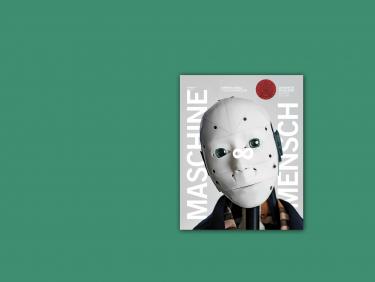
MACHINE & MEN
DEAR READERS OF RUPERTO CAROLA,
several times over the past few years we were faced with the danger of a computer virus paralysing parts of our societal and economic life. Now we have experienced how a different virus threatening all of humankind has led to a global shutdown of previously unimagined proportions. But the danger arising from various types of viruses is not the only link between humans and machines. The commonalities and differences between us and these complex devices, what each can learn from the other and how they can complement each other – that is the central subject of our latest RUPERTO CAROLA research journal entitled MACHINE & MAN.
The human body knows both “protein factories” and “soft machines”; conversely, machines are now equipped with artificial intelligence and can compete with humans in a number of areas, up to and including language. Electronic or neuroprostheses are human-machine interfaces that can compensate for missing or lost body functions. And the novel discipline of molecular systems engineering assembles tiny molecular and nanoscale components into molecular systems that will revolutionise conventional robotics and lay the groundwork for futuristic applications in our daily lives. In this edition we present the latest natural and life science research at Heidelberg University as well as the newest findings on the subject of MACHINE & MAN from the fields of economics, political science, history, ageing research, industrial and organisational psychology, law, computer linguistics and cinematic history. Due to restrictions relating to the coronavirus pandemic, our Expert Talk has been replaced by “The Expert View”, two articles that we have combined into a dialogue from the perspectives of brain research and geoinformatics.
I wish you a stimulating and enlightening reading experience in these special times!
Prof. Dr Dr h.c. Bernhard Eitel
Rector of Heidelberg University

- Hannah Monyer and Bernhard Höfle: At a beginning of a great era. With and against each other: Intelligence and software
- Christine Selhuber-Unkel: Groupe dynamics. Biohybrid robots and intelligent implants
- Ed Hurt: Molecular machines. The cellular protein factory
- Ulrich Schwarz: Soft machines. What we can learn from biological cells

- Mark Praetorius, Kurt Steinmetzger: Beyond silence. Overcoming deafness with electronic prostheses
- Rüdiger Rupp: Control by thought. Neuroprostheses as humane-machine interfaces
- Katja Mombaur, Alexander Schubert and Hans-Werner Wahl: Intelligent alliances. Robot assistance for better quality of life in old age
- Karlheinz Sonntag: In bed with the laptop. Digital working and health

- Ullrich Köthe: Deep networks. Learning from machines
- Anette Frank and Katja Markert: An algorithm for creativity? How machines attempt to understand human language
- Sebastian Harnisch and Kerstin Zettl: The blame game in cyberspace. Information technology as a weapon?
- Stefan J. Geibel: Fahrerlos. Driverless. Self-Driving vehicles and the law

- Gina Fuhrich and Katja Patzel-Mattern: Modern times. Keeping pace with the machine
- Melanie Arntz: The end of work? Between potential and profitability
- Bernd Schneidmüller and Paul Schweitzer-Martin: A fundamental change? Mass communication as the driver of a new era
- Henry Keazor: Fascination hybrids. Man-Machines in film




